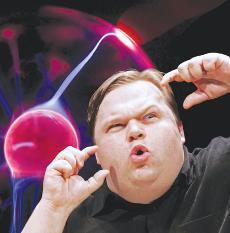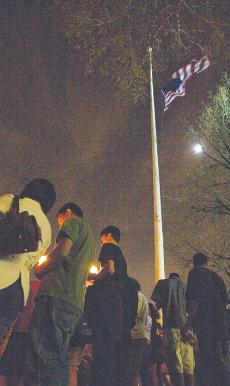Dateline: Downtown

Dateline: Downtown
May 7, 2007
I was chatting with my teacher (who I distinguish from a “Professor”) the other day. In class we’re covering the writing of a lady, Grace Paley, who was active in the Vietnam-era peace protests and during the second wave of the feminist movement. She’s nearing the great bowing-out, and like many of her time led a busy life.
When he spoke about her in class I was reminded of a man who passed on recently, Eric Weinberger, who some know locally from his work with Food Not Bombs. I covered his memorial service for a local publication and in the course of my research found that he had dropped out of the University of Chicago at age 15, had been involved with the Living Theater in New York during its storied era in the ’50s, had been a hobo, had marched with Martin Luther King in addition to conducting a pair of marathon hunger strikes one after the other during the Freedom Marches in the South during desegregation, in addition to his low key work as perhaps the main architect of many of the largest protests against the Vietnam War. All this stuff.
After class, while I was biting at his ankles, my teacher put to me the question, perhaps posed as a bit of a challenge, why my generation wasn’t more politically active. Why aren’t we leading lives like this? Where’s the anger, the commitment to change the world, in other words? I didn’t have a ready answer- because really, there isn’t one. There is an easy answer: we’re apathetic and consumerist. But I don’t feel that’s just. Here’s what I think.
Most popular culture since the ’60s has been, in one form or another, a response to the boomer generation. We hear about how politically motivated they were, how urgent the times were. And how apathetic the following generations have been. Weinberger, Paley, and my teacher, by the way, were not boomers. Boomers, though, when defending their generation, don’t mention the SLA, or the Manson Family, or the People’s Temple, or the New Age cults that came later. Not to mention the Marxist nonsense that the left were far too long in dispensing with. With idealism comes naiveté, and I think people see the post-’60s diaspora as evidence that hippies were gullible. That’s not the case across the board, but that’s the perception. The fact is that these malignant groups and ideologies were not hurting for members. So people don’t want to get taken in. Cynicism is a big part of it, and I’m not sure that cynicism isn’t warranted.
This extends to political action within the two-party system. The Chicago demonstrations at the DNC in ’68 came out of an attempt by the left to work within the system to attain their ends, and the Establishment of the time wasn’t having it. Fasst forward a few decades, and no one is surprised that the Democrats lined up behind President Bush for the Iraq War. People just don’t have any illusions anymore. If someone like Barack Obama makes a stand against the war on principle, it’s a pleasant surprise; it’s not expected. There weren’t any George McGoverns in 2003 for people to pin their hopes on, and anyway Iraq is different from Vietnam, at least domestically.
Why? Well, first of all, we had been attacked. The “Pearl Harbor” effect in our generation was channeled into a vanity war in Iraq. It happened almost overnight. Vietnam was a long, drawn-out affair with a civilian draft. Now we have a volunteer army of professional soldiers, not young working class kids. If this situation were reversed, I guess the calculus would be different.
But, lots of people were indeed skeptical about this present war during the run-up, and it’s not as if there was no protest. There was; it was simply drowned out. Today a plurality of voices across the political sphere are against the war effort, which is going badly anyway. I assert that we do not need to protest this war- the wheels are coming off that wagon without our help. Give it some time.
Why give it any time? Shouldn’t people make ethical stands? And why don’t they? Here it’s tempting to claim apathy, that people are just disengaged from the political process. In some cases that may be true, but there are a lot of people who are very engaged. They’re just engaged differently.
In lieu of expressed single issue political commitment, there’s a pronounced libertarian bent that simply wants the government and ideological salesmen out of our business. People are concerned about racism, or sexism, or homophobia, but there is so much wrong with the world, and the problems are so widely dispersed, that it’s less galling to pick an identity issue and stick with it. For a time it seemed that my generation had “moved right”, which would have explained everything, but now that’s not the case.
I’m not ready to say that people nowadays are so detached and uninformed. I think we are quite adroit, it’s just that the system has served America so poorly for so long that we’re waiting for something new to come along. People talk about the appearance of a “legitimate third party” like the second coming of the Messiah, and while it may be vague (no one is ready to say what this magic third party will stand for) but it also speaks to faith in our government. Misplaced faith? Maybe. But whatever you think about America, no one’s beaten the idea yet. As it’s presently constituted it may be a farcical misrepresentation of democracy at times, but that doesn’t mean will be so for all time.
My sincere hope is that people can take the best elements of the ’60s left, it’s commitment to pacifism and to egalitarianism, to social responsibility, and meld it with what’s good about the right’s commitment to individual liberty (which many on the left and too many on the right overlook) and build a smarter, better American system closer to where Jefferson was when he said that the government is best which governs least. Or not at all; the implication here is at that point, we won’t need government, because we’ll be able to look after ourselves and each other. That’s what I’m aiming at, and what I think my generation is too. That requires nothing but that we respect the meager liberty we find ourselves with, and defend it when necessary. The American experiment isn’t over, and if nothing else these are compelling times. I don’t feel apathetic, I feel motivated, and I hope you do as well.





























































